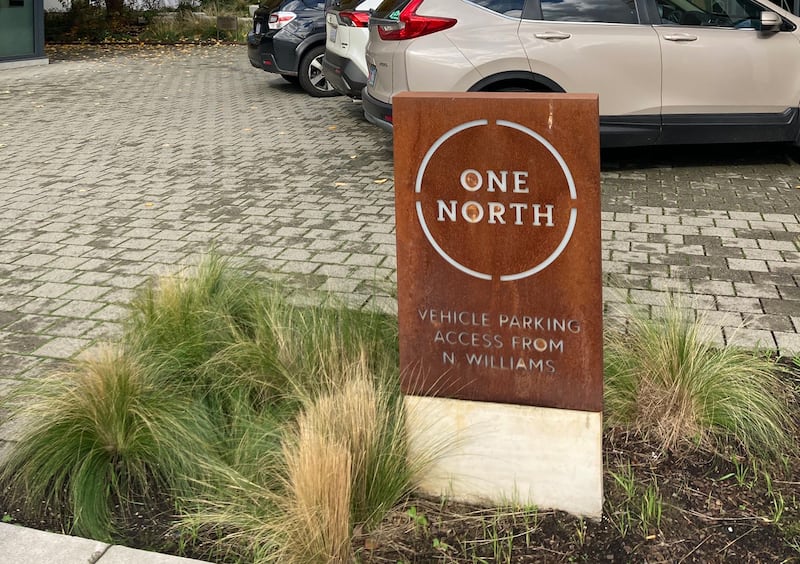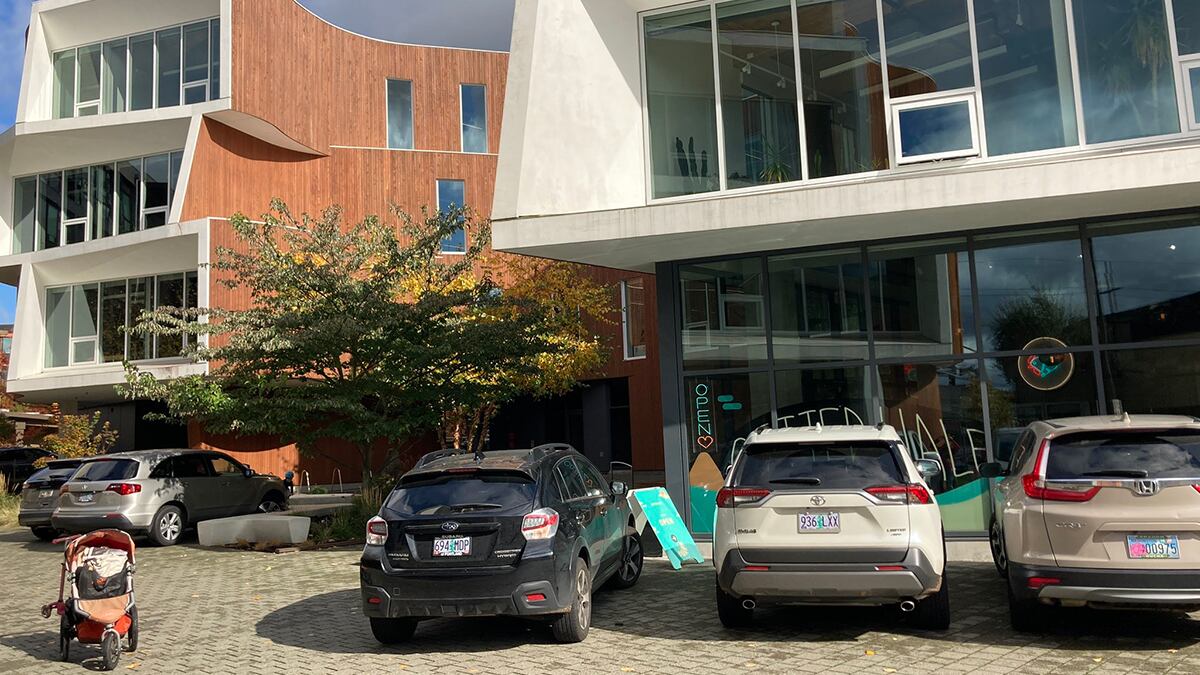In June 2016, Noah Dunham threw a party.
It was a block party at a newly renovated urban courtyard along North Fremont Street. Artists displayed their paintings. A church choir sang gospel songs. Gov. Kate Brown showed up in a bright pink jacket.
The object of all the fanfare? The courtyard itself, paved with cobblestones and sandwiched between the three buildings of the One North office and retail complex, a 1-acre, 85,000-square-foot development with little on-site parking.
The regional planning agency Metro spent $420,313 on the Courtyard at One North, promising a spot where residents could gather amid the rise of the Williams Avenue apartment canyon.
Developer and vintner Eric Lemelson, who co-owns the One North site, was so tickled with the courtyard that he hired Dunham to organize the block party—complete with wine from Lemelson’s vineyards.
Fast forward to a fall afternoon in late October 2021, and the courtyard now serves another purpose: It’s a parking lot. At one point last week, six cars were parked on the cobblestones.
WW spoke to operators and employees at eight businesses lining the courtyard. Many blamed drivers for the food delivery apps Uber Eats and Grubhub, who they say commonly treat the plaza as parking. Others blamed restaurant patrons. Still others blame government agencies for not enforcing the “no parking” policy, while those same agencies deferred questions to other agencies.
Dunham doesn’t care who’s to blame. He just doesn’t want cars in his urban park.
“The intent was to really be a public courtyard, more or less park space,” Dunham says. “It’s definitely disappointing. I’m a big proponent of green spaces, so I think public spaces should remain public spaces.”

For Dunham, the encroachment of cars into the One North plaza is a betrayal. Other neighbors agree, posting photos of vehicles to Twitter in displeasure.
But the conflict also demonstrates how car culture has slid back into Portlanders’ daily routines during the pandemic. Social distancing inspired local governments to try out new outdoor dining plazas and promenades. But it also spurred a revival of activities in which people remain safely enclosed in their cars, from drive-in theaters to drive-thru strip clubs (“Cabin Fever,” WW, May 6, 2020).
And perhaps no vehicular business has boomed like delivery apps, whose drivers commonly use the One North courtyard to pick up meals from Better Half PDX, according to an employee at nearby Bread & Honey Cafe.
“If the management really hates [the cars],” says Trevor Rhoads, who works at Bread & Honey, “they should put up signs.”
Kelly Haarsager, an owner of Better Half, says she supports blocking off the street and putting up no parking signs—but she says no one enforces such a policy. She concedes that third-party delivery drivers do park there for food pickups. She later sent WW an email saying the property manager is looking to install no parking signs and that “there are times that people park in the courtyard and walk off, and we don’t always see where they go.”
And the delivery drivers?
“There is no place else to go,” says driver Austin McCullough, who was delivering fiber lasers on a Monday morning.
That’s not what two local governments had in mind in 2015, when the two biggest office buildings of One North—known as Karuna East and West—were built.
In awarding a $420,313 grant to the project, Metro cited the courtyard as a green space for a neighborhood with a shortage. “The courtyard’s design subordinates the automobile and, instead of surface parking, provides a public courtyard with vegetation and open space,” the agency wrote. “In addition to serving as a hub for the neighborhood, the courtyard will provide many additional public benefits, including natural cooling, reduced emissions and a reduction in energy demand for air conditioning.”
Yet the developers didn’t block cars from entering the courtyard, because a neighboring property owner on the block wanted to maintain an alleyway—for access to an existing parking lot.
The two biggest buildings in the office park are owned by Eric Lemelson, whose company did not return multiple calls and voicemails from WW asking about the parked vehicles. Neither did the building’s manager, Pingree Northwest.
Metro spokeswoman Carrie Belding told WW on Nov. 1 that agency officials “visited the courtyard today…and are working to ensure that the courtyard is enjoyed as it was always intended,” but she deferred questions about the parked cars to PBOT. Belding added that the developers “set aside a significant amount of land for public space rather than additional building or parking.”
But PBOT couldn’t definitively say what is or is not allowed in the courtyard, including parking: “We are investigating the terms of our easement and what is allowed in that space,” says bureau spokesman Dylan Rivera.
Meanwhile, neighbors just want the cars gone.
“The courtyard is a car-free oasis in an otherwise very busy neighborhood,” says local resident Michelle DuBarry, who takes her kids there frequently. “I’m sad that the space has been turned over to cars and parking—a spot once welcoming to families and children now feels dangerous.”
Sophie Peel contributed reporting to this story.
